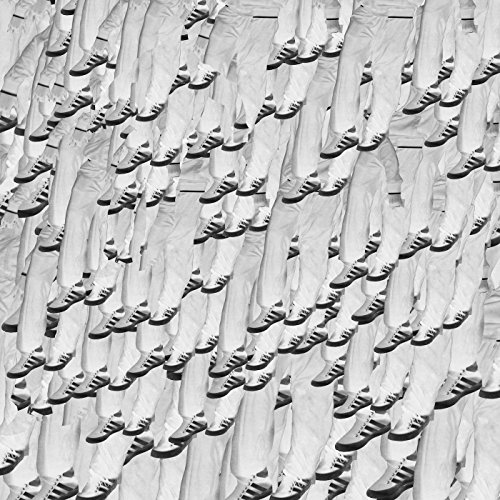
RP Boo
Fingers, Bank Pads and Shoe Prints
Release Date: Jun 30, 2015
Genre(s): Electronic
Record label: Planet Mu
Music Critic Score
How the Music Critic Score works
Buy Fingers, Bank Pads and Shoe Prints from Amazon
Album Review: Fingers, Bank Pads and Shoe Prints by RP Boo
Great, Based on 9 Critics
Based on rating 4.3/5
RP Boo's music is challenging. Not in the sense that it's esoteric, but in the sense that its twisted rhythms offer an actual challenge to dancers. In its original context, footwork music is made to push the limits of its associated dance—to be played in the circle at a community center or school gymnasium in Chicago, where it will literally keep people on their feet.
Based on rating 8.0/10
If RP Boo, Traxman, and DJ Rashad constitute the John Coltrane (father), Pharoah Sanders (son), and Albert Ayler (holy ghost) of Chicago footwork, then Boo, aka Kavain Space, probably gets to be Trane. Others might have traveled further, but he was, arguably, the first. The son of a former Prince bassist, Space's work has a deferential sense of groove; while his peers Rashad, Jlin, and DJ Spinn take footwork outside of itself and draw in outside inspirations, Space seems largely driven by the desire to inspire footwork dancers.
Based on rating 8/10
Footwork was never meant to be funeral music. Unwitting scene grandfather RP Boo has said that his earliest ghetto-house derived tracks were explicitly constructed so that he could perform at the after-parties of Illinois’ annual Bud Billiken parade — these were songs meant to make people, and specifically Chicagoans, dance. Decades later, footwork still mostly retains that early ecstasy, but just over a year after the death of godfather and guiding hand Rashad Harden — known only under the recording alias of DJ Rashad — it’s hard not to look back at his discography, and the whole of the sound he helped popularize, with a newly tear-misted lens.
Based on rating 4/5
Footwork is a breakneck mutation of ghetto house that’s been banging out of speakers at upwards of 150BPM since the late 90s. In Chicago, it encourages the very specific dance style of its title: twisty foot movements that fall between house dance and breakdancing. For the rhythmically challenged, that means toe-tapping at a furious speed to its frenetic mix of jackhammer vocal samples and skittering, pounding lo-fi drum machines.
Based on rating 7/10
When Mike Paradinas began paying attention to Chicago's frantic, sample-twisting footwork genre, what drew him to the music was how abstract and unconventional it was. Some of the music is so rapid and bizarre that it's hard to imagine anyone dancing to it, yet it provides the soundtrack to dance battles and competitions. Paradinas was more interested in exploring the bizarre side of the genre rather than releasing more dancefloor-friendly tracks, and releases by Chicago producers including DJ Nate and DJ Roc bewildered and thrilled listeners who had never heard anything like these sounds before.
Based on rating 3.5/5
Let’s assume the history of footwork — RP Boo is the father of footwork, etc. — and instead focus on the materiality of the genre’s movement. Footwork often inspires a virtuosity of physical movement in dance and is itself virtuosic through its devotion to movement — a perpetual cathartic language occurring between the dance squad and DJ. It has a way of stirring physical and mental states by aggravating internal stress or conflict, gesturing to the release of the psychosomatic by nature of its acceleration.
Based on rating 7/10
Repetition is perhaps the defining feature of electronic dance music. It is a deal breaker for many people. Whether or not a listener can embrace the repetition inherent in the genre is probably the deciding factor in making fans of techno or drum and bass music. Nowhere is the repetition factor more significant than in the footwork genre, particularly in the music of its originator RP Boo.
Based on rating 6/10
Between the recent influx of PC artists reaching the furthest levels of pretention or genius (depending on your view) and synapse melting beatmakers like Eprom, it feels like electronic music is more conceptual than ever. Perhaps we’ve forgotten the genesis of it all, these beats were meant to make us dance. Well, RP Boo is here to remind you. He’s culled a sleek collection of stark, danceable and occasionally menacing tracks on Fingers, Bank Pads and Shoe Prints.
Opinion: Excellent
To talk with any kind of authority on how the genre of footwork has evolved, it's necessary to try and pinpoint its Year Zero. This is kind of tricky, and Kavain Space – a producer, now in his forties, who records as RP Boo – has a great deal of responsibility for this trickiness. Amidst an ever-mutating culture of dance music in Chicago, distinct scenes and genres coming together at unlikely intersections, Space's intuitive, self-taught approach to making beats led to him creating what's now considered the first ever footwork track, back in 1997.
'Fingers, Bank Pads and Shoe Prints'
is available now

